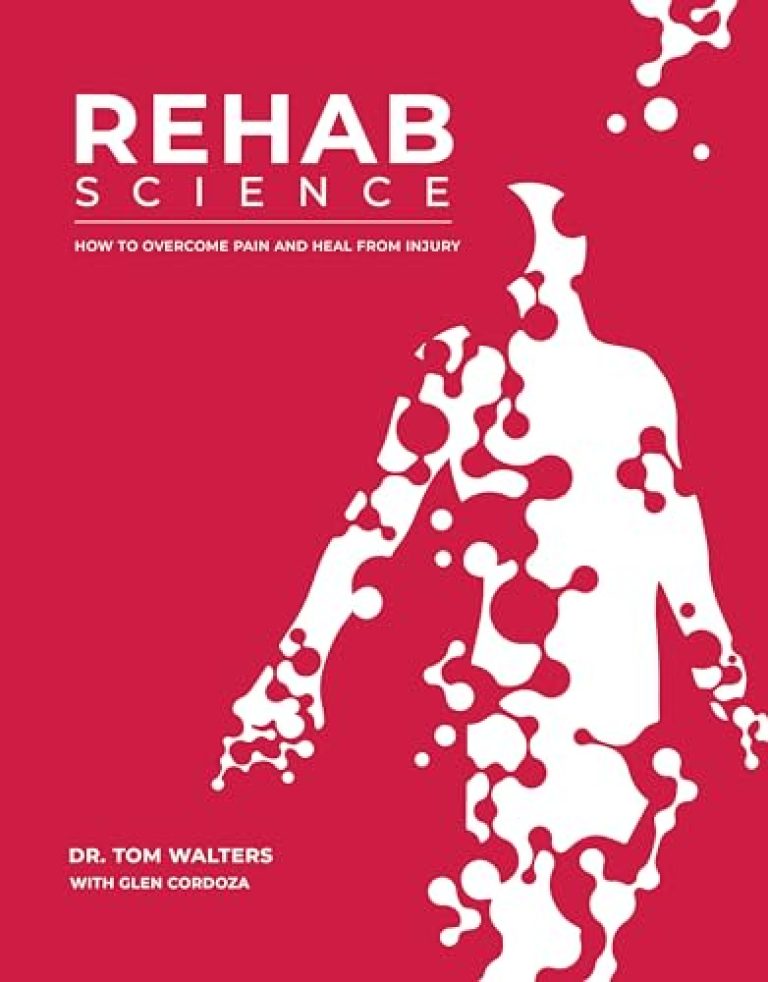Price: $33.36
(as of Feb 10, 2024 23:46:38 UTC – Details)

Alleviate Pain. Rehabilitate Injuries. Move Better!
At some point in your life, you will experience pain and suffer from injury. But you are not powerless. Your body is not fragile. It is strong and adaptable. With the right education, exercise strategies, and mindset, you can figure out what’s wrong and take the first steps toward healing. That is exactly what you will learn how to do in Rehab Science.
In this book, you will gain:
A foundational understanding of pain science—and how to treat both acute and chronic pain conditionsThe ability to systematically address injuries—identify the type of injury you have and implement the right methods and exercisesStep-by-step programs for improving movement and mobility and increasing strength and tissue capacity Pain-relieving and injury-healing strategies, including soft tissue massage, stretching, mobility, and resistance exerciseThe confidence and education to make informed decisions—like whether or not to get surgery Insight on how to prevent injuries and future flare-ups
Being armed with such knowledge removes the fear and anxiety associated with pain and injury and frees you up to take charge of your health. Because there are solutions. Whether you have pain from unknown causes, you sustained an injury, or you have chronic pain and nothing else has worked, the protocols give you a clear blueprint to follow. Simply go to the body region where you feel pain or have an injury, choose the protocol that matches your symptoms or condition, and start following the three-phase exercise program.
This book provides 30 programs for the most common pain and injuries in every body region:
Low back painSprains and strains—including ankle and wrist sprains, hamstring strains, and whiplashNerve pain—such as sciatica, carpal tunnel, herniated discs, and lumbar stenosisTendinopathies—like tennis elbow, golfer’s elbow, hip flexor, gluteal, and patellar tendinopathyLigament and tendon tears—Achilles, rotator cuff, hamstring, groin, ACL, MCL, LCL, and PCL Shoulder and hip impingementsDislocations and labral tears Meniscus tearsPlantar fasciitisShin splintsArthritis—neck, knee, and hip And much, much more
If you want the power to get out of pain and rehab your injury—and to do as much as possible on your own—look no further than Rehab Science.
From the Publisher




1: Learn About Pain and Injury (Part I: Pain, and Part II: Injury)
Learning about pain and injury—how they work, what the different types are, and the strategies for healing—will provide meaning and purpose to the treatment protocols and exercise programs. Understanding improves adherence, and adherence promotes consistency, both of which are necessary for getting better.
2: Go to Your Pain/Injury Site or the Body Region You Want to Improve (Part III: Rehab)
Whether you have a pain or injury or you simply want to progress your movement, mobility, and strength, go to the Body Area Map on page 117 and then flip to the joint or body region that you want to improve or maintain.


3: Choose the Protocol That Matches Your Symptoms
At the beginning of each body region chapter are illustrations that represent the protocols in that section. If you have pain in your shoulder, for example, go to the shoulder chapter, look at the illustrations, and choose the protocol that best matches your symptoms.
4: Read the Protocol Categories to Learn About the Condition
Each protocol includes a description, a list of signs and symptoms, aggravating factors, a prognosis (healing time frame), a treatment strategy, and a rehab exercise program broken into three phases. These categories provide a comprehensive framework for identifying, treating, and preventing the pain and injury associated with the protocol—and equips you with the tools to guide your rehab.






5: Follow the Phase 1 Exercise Program to Alleviate Pain and Reduce Muscle Tension
Phase 1 is for getting pain under control and mainly includes soft tissue mobilizations (self-guided massage) and unloaded movements. These can be done after an injury or anytime you experience a flare-up—when you’re not injured but you have minor pain or stiffness.
6: Follow the Phase 2 Exercise Program to Improve Movement and Mobility
Phase 2 is for improving range of motion, sensorimotor control, and strength impairments using mobility, flexibility, isometric, and eccentric exercises.
7: Follow the Phase 3 Exercise Program to Rebuild Capacity and Strength
Phase 3 is all about rebuilding tissue integrity through full range of motion resistance training exercises.


8: Incorporate CAM Treatments Based on Interest and Availability
When it comes to the most effective treatments for pain and injury, look no further than the rehab exercise protocols. But perhaps you have a problem that hasn’t responded well to traditional care. The complementary and alternative medicine (CAM) interventions give you more options to explore.
Publisher : Victory Belt Publishing (May 30, 2023)
Language : English
Hardcover : 496 pages
ISBN-10 : 1628601396
ISBN-13 : 978-1628601398
Item Weight : 1.25 pounds
Dimensions : 8.72 x 1.4 x 11.14 inches










